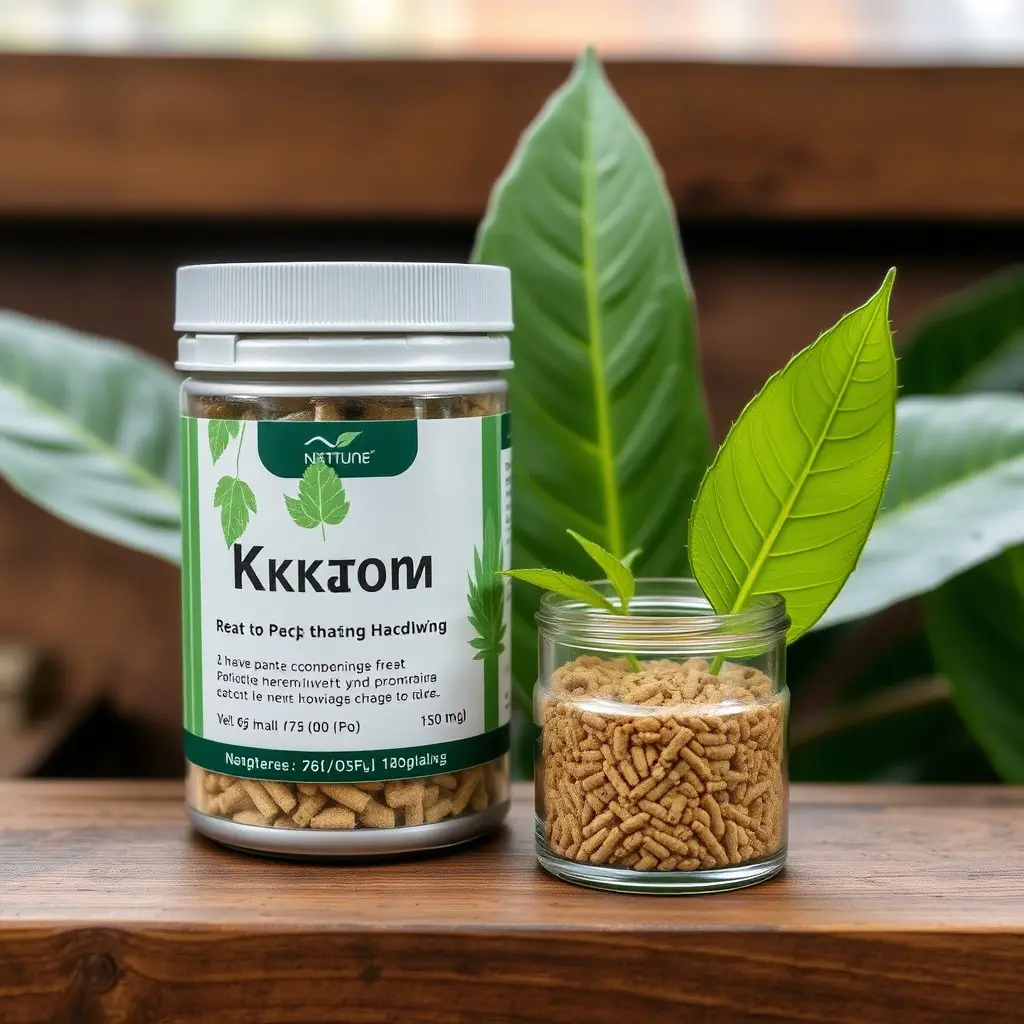Kratom, derived from the Mitragyna speciosa tree's leaves, is a subject of interest for its potential impact on stress and anxiety. Its primary compounds, mitragynine and 7-hydroxymitragynine, may influence brain neurotransmitters to potentially improve mood and alleviate psychological distress. Users often report benefits in managing stress responses by regulating cortisol levels, with anxiolytic effects that can ease anxiety without the side effects associated with conventional treatments. However, kratom's legal status is complex; while it's not a controlled substance in New York as of early 2023, its federal classification as a Schedule I drug by the DEA—currently under a court-ordered injunction—means its legality can change rapidly. Consumers must stay informed on both state and federal regulations to ensure compliance. It's essential for individuals in New York considering kratom for wellness to consult healthcare professionals, consider its potential interactions with other medications, and verify the quality of products due to their varying purity levels. Safe use includes starting with a low dose, avoiding combining it with other substances, and being mindful of side effects. Regular updates on legal status and professional medical advice are critical for anyone looking to use kratom responsibly and effectively.
Exploring the potential of kratom as a natural supplement for stress and anxiety relief, this article delves into its role in wellness routines, particularly within the context of New York’s legal framework. With a focus on the science underpinning its effects and navigating its legality in the state, readers will gain insights into how kratom might be a viable option for managing these common yet debilitating conditions. Is kratom legal in New York? We’ll clarify that aspect first before exploring its benefits and usage considerations. Join us on this informative journey through the intersection of herbal supplements and mental well-being.
- Understanding Kratom's Role in Stress and Anxiety Management: A Glimpse at Its Legality in New York
- The Science Behind Kratom: How It Can Help Alleviate Stress and Anxiety Symptoms
- Navigating Kratom Legality in New York: Legal Status, Safety Considerations, and Best Practices for Use
Understanding Kratom's Role in Stress and Anxiety Management: A Glimpse at Its Legality in New York

Kratom, derived from the leaves of the Mitragyna speciosa tree native to Southeast Asia, has garnered attention for its potential effects on stress and anxiety management. The plant contains a mix of alkaloids, primarily mitragynine and 7-hydroxymitragynine, which are believed to interact with various neurotransmitter systems in the brain, potentially leading to mood enhancement and relief from psychological discomfort. Users report that kratom can influence cognitive processes associated with stress response by modulating the activity of hormones like cortisol, which is central to the body’s stress reaction. Additionally, its anxiolytic properties may help alleviate symptoms of anxiety, offering a natural alternative for those seeking relief from these conditions without the side effects often associated with conventional medications.
When considering the use of kratom for managing stress and anxiety, it’s crucial to be aware of its legal status, particularly in New York. As of the latest updates, kratom is a controlled substance under New York State law. This means that it is illegal to possess, distribute, or sell kratom within the state’s borders without proper authorization. The DEA initially placed kratom into the Schedule I category of controlled substances in 2016, which would have made it federally illegal. However, following public outcry and a petition that gathered over 143,000 signatures, the decision was reversed, and kratom remains a controlled substance at the federal level. This legislative dance underscores the evolving nature of kratom’s legal status, which varies across different states and cities within the United States. In New York, individuals considering kratom as part of their wellness routine should first consult with healthcare professionals and stay informed about current legislation to ensure compliance with state laws.
The Science Behind Kratom: How It Can Help Alleviate Stress and Anxiety Symptoms

mitragynine and 7-hydroxymitragynine, the primary active alkaloids found in kratom leaves, have been studied for their potential therapeutic effects on mood regulation. These compounds interact with various neurotransmitter systems within the brain, including opioid receptors, which may contribute to its anxiolytic and antidepressant properties. Preclinical studies suggest that kratom can modulate levels of serotonin and norepinephrine, neurotransmitters directly linked to mood regulation and stress response. This modulation could potentially alleviate symptoms of stress and anxiety in individuals who experience these conditions.
It’s important to note the legal status of kratom varies across different regions, including the state of New York. As of my knowledge cutoff in 2023, kratom is not explicitly listed as a controlled substance in New York State, making it legal to possess and consume within the state’s boundaries. However, the regulatory landscape for kratom is subject to change, and consumers should verify the current legality from authoritative sources before use. While kratom holds promise as an adjunct therapy for stress and anxiety management, it should be used responsibly and in conjunction with other healthy lifestyle practices. Individuals considering kratom as a supplement for managing their stress and anxiety are advised to consult with healthcare professionals to ensure safe and effective usage, particularly given the potential for interactions with other medications and the need for personalized medical advice.
Navigating Kratom Legality in New York: Legal Status, Safety Considerations, and Best Practices for Use

When considering the use of kratom supplements to manage stress and anxiety, it’s crucial to first understand its legal status in New York. As of the knowledge cutoff date in early 2023, kratom is legally available in New York state, with no statewide ban on its sale or possession. However, the legality of kratom can vary by municipality, so it’s important to verify local regulations before purchasing or consuming any kratom products. The Drug Enforcement Administration (DEA) has placed kratom in the Schedule I category of controlled substances, but a federal court injunction currently prevents this classification from being enforced. This legal pendulum has significant implications for consumers, highlighting the need for up-to-date information on kratom’s status at both state and federal levels.
Safety considerations are paramount when incorporating kratom into one’s wellness routine. Users in New York should approach kratom with caution, as its effects can be powerful and unpredictable. It’s essential to start with a low dose to gauge individual sensitivity, and to avoid combining kratom with other substances, including prescription medications, due to the risk of adverse interactions. Additionally, purchasing from reputable sources is critical, as the quality and purity of kratom products can vary widely among vendors. Consumers should educate themselves on proper dosing, potential side effects, and the various strains available, each offering different effects. Adhering to best practices for use, such as maintaining a healthy diet and lifestyle alongside kratom consumption, can enhance its efficacy in managing stress and anxiety while minimizing any negative impacts. Always consult with a healthcare provider before beginning any new supplement regimen, particularly if you have underlying health conditions or are taking other medications.
In concluding our exploration of the potential benefits of kratom supplements in managing stress and anxiety, it’s clear that this botanical substance holds promise for individuals seeking natural alternatives to conventional treatments. While understanding its role and the science behind its effects is crucial, it’s equally important to be informed about its legal status, particularly in New York, where strict regulations apply. Prospective users should navigate these laws carefully, adhering to safety considerations and best practices for use to ensure a positive experience. As kratom’s legality in New York continues to evolve, staying updated on current regulations is essential for anyone considering incorporating kratom into their wellness routine.






